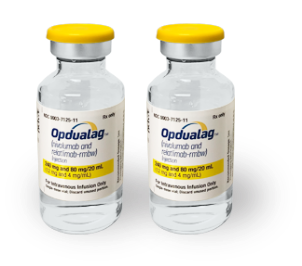- Center on Health Equity & Access
- Clinical
- Health Care Cost
- Health Care Delivery
- Insurance
- Policy
- Technology
- Value-Based Care
Study Shows Potential for Using Nivolumab Plus Relatlimab Before Surgery in NSCLC
Authors discuss the merits of using a pair of immunotherapy treatments aimed at separate targets.
A study published this week in Nature Medicine demonstrated the feasibility of using 2 different immunotherapy treatments ahead of surgery for separate targets in patients with metastatic non–small cell lung cancer (NSCLC).1
Authors primarily from the West German Cancer Center in Essen, Germany, presented findings from a phase 2 study (NCT04205552) involving the preoperative use of the PD-1 inhibitor nivolumab, with and without the anti-LAG-3 antibody relatlimab.
The authors noted that significant advances in adjuvant therapy have been seen in lung cancer treatment where targets are well-known, such as the use of osimertinib to target EGFR,2 not every case offers such an opportunity.
In these cases, the authors wrote, combining immune checkpoint inhibitors (ICIs) and chemotherapy has offered strong response rates, but with potential downsides. “Although there is a clear interaction between ICI and chemotherapy in terms of efficacy, the added toxicities of chemotherapy are not required in all NSCLC patients to unfold the full curative potential of ICI treatment.”
Using different combinations ahead of surgery could offer certain advantages, the authors wrote.
“Clinical and biological considerations provide strong arguments for moving relapse-preventing systemic therapies to the preoperative or perioperative setting,” the authors write. Especially when using immune checkpoint inhibitors, they argue, “reinvigoration of a suppressed immune response may be more effective while tumor-infiltrating lymphocytes are still present in their native tumor context.”
They presented results from 60 patients taking part in the ongoing, open-label phase 2 study. These patients were not stratified by biomarker and were randomized to receive 2 preoperative doses of nivolumab either with or without relatlimab, Not only would this spare patients the effects of chemotherapy, but this immunotherapy combination had worked well previously.3
Odualag packaging | Image credit: Bristol Myers Squibb

“Importantly, in a randomized phase 3 study in patients with unresectable or metastatic melanoma combining the PD-1 antibody nivolumab and relatlimab, an immunoglobulin G4 antibody blocking LAG-3 was superior to nivolumab monotherapy in terms of radiographic response and progression-free survival endpoints,” the authors wrote.
A fixed-dose combination of nivolumab and relatlimab is approved in metastatic melanoma and sold as Opdualag.
The primary endpoint was the feasibility of surgery in 43 days (after 6 weeks), which the authors said was met by all patients, with “curative resection achieved by 95% of patients.” Secondary endpoints were:
- Major pathological (≤10% viable tumor cells) and objective radiographic responses seen in 27% and 10% of patients in the nivolumab-only arm and 30% and 27% of the patients in the nivolumab-relatlimab arm.
- Complete resection of tumors and lymph notes was seen in 100% of patients in the nivolumab arm and 90% of patients in the nivolumab-relatlimab arm.
- After 12 months, in the nivolumab arm, disease-free survival (DFS) was 89% and overall survival (OS) was 93%. In the nivolumab-relatlimab arm, at 12-month DFS was 93% and 12-month OS was 100%.
- Treatment-emergent adverse events of grade 3 or higher were seen in 10% of the nivolumab at and 13% of the nivolumab-relatlimab arm.
“This study establishes the feasibility and safety of dual targeting of PD-1 and LAG-3 before lung cancer surgery,” the authors concluded.
References
- Schuler M, Cuppens K, Plones T, et al. Neoadjuvant nivolumab with or without relatlimab in resectable non-small-cell lung cancer: a randomized phase 2 trial. Nature Med. Published online April 30, 2024. https://doi.org/10.1038/s41591-024-02965-0
- Tsuboi M, Herbst RS, John T. Overall survival with osimertinib in resected EGFR-mutated NSCLC. N Engl J Med. 2023;389(2):137-147. doi: 10.1056/NEJMoa2304594
- Tawbi HA, Schadendorf D, Lipson EJ, et al. Relatlimab and nivolumab versus nivolumab in untreated advanced melanoma. N Engl J Med. 2022;386(1):24–34 DOI: 10.1056/NEJMoa2109970
Addressing Financial Toxicity With Navigators and Better Conversations Around Decision Making
June 5th 2018Financial toxicity impacts a lot more than a patient's finances—it leads to nonadherence and poorer health outcomes. Financial navigators are increasingly being used to be proactive about addressing high healthcare costs and the resulting financial toxicity.
Listen
